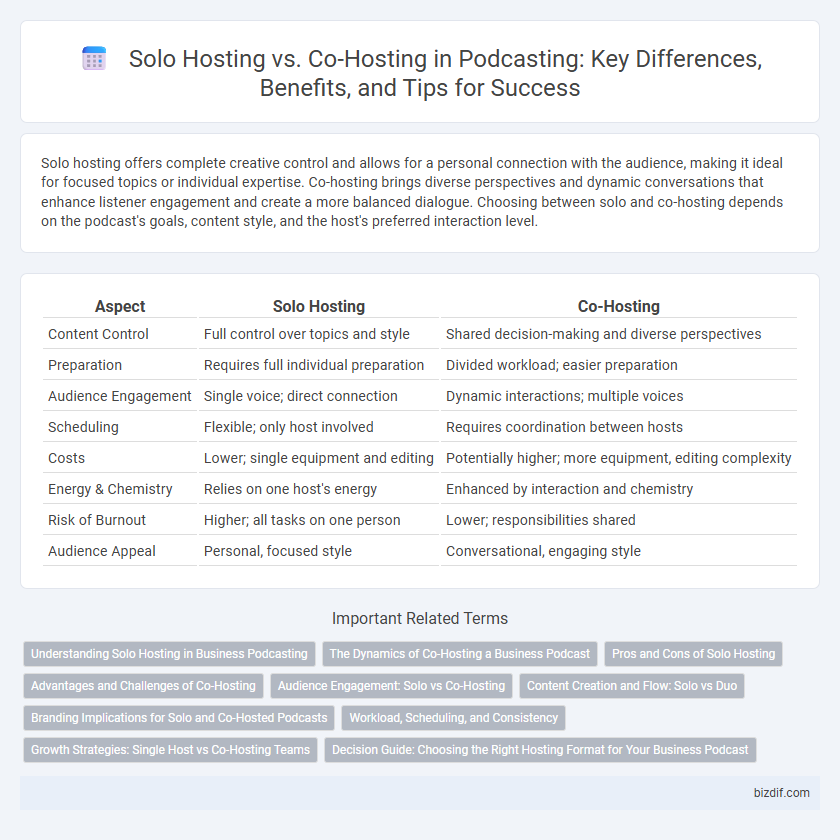Solo hosting offers complete creative control and allows for a personal connection with the audience, making it ideal for focused topics or individual expertise. Co-hosting brings diverse perspectives and dynamic conversations that enhance listener engagement and create a more balanced dialogue. Choosing between solo and co-hosting depends on the podcast's goals, content style, and the host's preferred interaction level.
Table of Comparison
| Aspect | Solo Hosting | Co-Hosting |
|---|---|---|
| Content Control | Full control over topics and style | Shared decision-making and diverse perspectives |
| Preparation | Requires full individual preparation | Divided workload; easier preparation |
| Audience Engagement | Single voice; direct connection | Dynamic interactions; multiple voices |
| Scheduling | Flexible; only host involved | Requires coordination between hosts |
| Costs | Lower; single equipment and editing | Potentially higher; more equipment, editing complexity |
| Energy & Chemistry | Relies on one host's energy | Enhanced by interaction and chemistry |
| Risk of Burnout | Higher; all tasks on one person | Lower; responsibilities shared |
| Audience Appeal | Personal, focused style | Conversational, engaging style |
Understanding Solo Hosting in Business Podcasting
Solo hosting in business podcasting allows for complete creative control, enabling hosts to tailor content precisely to their target audience's needs and establish a strong, personal brand identity. This approach simplifies scheduling and production, reducing dependencies on others and accelerating content delivery. Maintaining consistent, high-quality solo episodes enhances authority and trustworthiness, key factors in driving audience engagement and business growth.
The Dynamics of Co-Hosting a Business Podcast
Co-hosting a business podcast enhances conversational dynamics and audience engagement by offering multiple perspectives and expertise, which drives richer content and deeper insights. The natural interplay between co-hosts creates a more relatable and authentic listening experience, fostering stronger listener loyalty and community building. Shared responsibilities in planning, recording, and promoting episodes increase consistency and reduce burnout, ensuring sustained podcast growth and quality.
Pros and Cons of Solo Hosting
Solo hosting in podcasting offers full creative control and allows for a more intimate connection with the audience, making it easier to establish a personal brand. The primary challenge lies in maintaining consistent energy and diverse perspectives, which can sometimes lead to content feeling less dynamic or engaging. Solo hosts bear the entire responsibility for content creation, production, and promotion, potentially increasing workload and risk of burnout.
Advantages and Challenges of Co-Hosting
Co-hosting a podcast enhances dynamic conversations and diverse perspectives, increasing audience engagement and listener retention. It distributes the workload of research, scriptwriting, and technical responsibilities, reducing individual stress and improving content quality. However, co-hosting requires strong communication and conflict resolution skills to manage differing opinions, schedules, and creative visions, which can complicate the production process.
Audience Engagement: Solo vs Co-Hosting
Audience engagement in podcasting varies significantly between solo hosting and co-hosting formats. Solo hosts maintain direct, personal connection with listeners, allowing for focused storytelling and uninterrupted delivery, while co-hosts create dynamic interactions and diverse perspectives that stimulate listener interest and foster a sense of community. Research shows co-hosted podcasts tend to generate higher engagement rates due to conversational energy and relatable dialogue.
Content Creation and Flow: Solo vs Duo
Solo hosting provides complete creative control, allowing podcasters to tailor content precisely to their vision and maintain a consistent narrative flow. Co-hosting introduces dynamic interactions and diverse perspectives, enriching content complexity and fostering engaging dialogue that can energize the audience. However, balancing dual inputs requires careful coordination to ensure smooth transitions and maintain cohesive pacing throughout episodes.
Branding Implications for Solo and Co-Hosted Podcasts
Solo hosting allows for a singular, consistent voice that strengthens personal branding and fosters a direct connection with the audience. In contrast, co-hosting presents multiple perspectives and dynamic interactions, enhancing brand relatability and broadening audience appeal through diverse personalities. Effective branding in co-hosted podcasts depends on the hosts' chemistry and unified messaging, while solo podcasts benefit from a clear, focused brand identity.
Workload, Scheduling, and Consistency
Solo hosting a podcast demands managing all aspects including content creation, editing, and promotion, which increases workload but allows complete control over scheduling and consistency. Co-hosting divides responsibilities, reducing individual workload and enabling more flexible scheduling through shared availability, but requires coordination to maintain consistent episode releases. Both approaches impact the podcast's production flow and audience retention differently based on how workload and scheduling challenges are managed.
Growth Strategies: Single Host vs Co-Hosting Teams
Solo hosting allows for consistent branding and personal connection, driving audience loyalty through a singular voice and vision. Co-hosting teams leverage diverse perspectives and dynamic interactions, enhancing content variety and increasing reach through combined networks. Growth strategies for solo hosts emphasize focused niche expertise and authentic storytelling, while co-hosting benefits from collaborative promotion and multi-angle engagement.
Decision Guide: Choosing the Right Hosting Format for Your Business Podcast
Selecting the right hosting format for your business podcast hinges on your content goals and audience engagement style. Solo hosting offers complete creative control and a personal connection with listeners, ideal for thought leadership and in-depth expertise. Co-hosting fosters dynamic conversations and diverse perspectives, enhancing listener retention and broadening reach through natural dialogue.
Solo Hosting vs Co-Hosting Infographic

 bizdif.com
bizdif.com